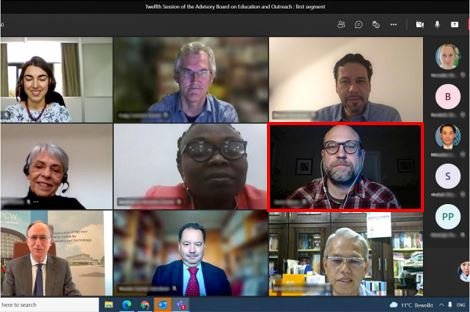Corporate logo for the Organization for the Prohibition of Chemical Weapons
Growing up in Bay City, Michigan, I never dreamed that at some point in my life, I would be an e-learning expert given the chance to work with a bunch of super smart people from around the world who were dedicating part of their lives to the mission of destroying some of the most inhumane weapons ever invented by man. This isn’t as much a failure of my imagination as it is recognition that, as a child, e-learning hadn’t been invented, I had no idea such organizations existed, and I had no conception of just how blessed I would be in my life.
Today, to be a small part of a Nobel Peace Prize-winning organization is more than I could have hoped for. In the picture below, you can see my excitement (I had to wake up at 4:45am to attend the meeting taking place at 1pm Central European Time.
The role of the Advisory Board on Education and Outreach (ABEO) is to provide specialized advice in terms of education and outreach, the development of e-learning strategies, and ensuring these activities are carried out in a coordinated and cost-effective manner.
The United Nations Study on Disarmament and Non-proliferation (2002) education begins by stating:
There has never been a greater need for education in the areas of disarmament and non-proliferation, especially with regard to weapons of mass destruction, but also in the field of small arms and international terrorism…The overall objective of disarmament and non-proliferation education and training is to impart knowledge and skills to individuals to empower them to make their contribution, as national and world citizens, to the achievement of concrete disarmament and non-proliferation measures and the ultimate goal of general and complete disarmament under effective international control.
As noted in the report,
Science and technology transformed the world in the twentieth century. Living standards improved but warfare was rendered more deadly. Weapons of mass destruction -biological, chemical and nuclear - and their means of delivery were developed, as ever more sophisticated conventional armaments were produced and disseminated. The horrors and destruction of armed conflict persist.
And this is Jacques Ellul’s point, exactly, in The Technological Society - we cannot have the good without the bad. As I write this, The Associate Press has reported, “Russia plans to give its nuclear weapons apparatus a practice run this weekend.”
The cynic in my says that education stands little chance in the face of evil, but I have long embraced Camus’s point that if he who bases his hopes on human nature is a fool, he who gives up in the face of circumstances in a coward. To be part of the OPCW’s ABEO is part of that formidable gamble that words are more powerful than munitions. I’ve never been much of a gambler, and when I have bet, I have always lost, but this where I have laid my chips:
High- and low-technology teaching tools and techniques for conveying content, stimulating interest and evoking emotion such as videos, animation, electronic games, theatre, dance, films and the graphic arts such as photography are useful and effective means for presenting the subject of disarmament and non-proliferation as well as concepts such as tolerance, democracy and conflict resolution. (section 27)
Dr. Richard Guthrie, another member of OPCW’s Advisory Board for Education & Outreach, assembled this FAQ regarding chemical weapons and the Ukraine: https://www.cbw-events.org.uk/faqs-ukraine.html
Thanks also to Richard for pointing out the important publications below:
Two publications released last week in the UK may be of interest:
One is a brief report from the House of Commons Library on: "Ukraine: Fears Russia could use chemical weapons" (available at https://commonslibrary.parliament.uk/ukraine-fears-russia-could-use-chemical-weapons/).
The Library is a very useful source of non-party political advice in the British Parliament. The report has a little bit of a mix up between chemical and biological issues but is useful, nonetheless.
The other is a report from the Royal Society of Chemistry on racial and ethnic inequalities in the chemical sciences (available via https://www.rsc.org/news-events/articles/2022/mar/new-1.5m-unit-to-tackle-racial-inequalities-in-science/).
Pages 39-40 of the report discuss generating a global chemistry community and so may be of particular note to Board members. This report follows on from the sense of belonging report published last year (https://www.rsc.org/new-perspectives/talent/belonging-in-the-chemical-sciences/).
I hope these links are of use.

